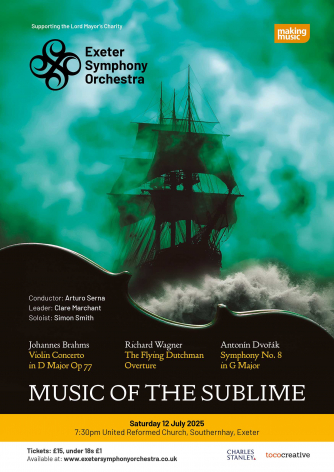Details
Southernhay United Reformed Church
Dix's Field
Exeter
Devon
EX1 1QA
England
Programme
Richard Wagner – The Flying Dutchman, WWV 63: Overture
Johannes Brahms – Violin Concerto in D major, Op.77
~ Interval ~
Antonin Dvorak – Symphony no.8 in G major, Op.88
Performers
Simon Smith – violin
Arturo Serna – Conductor
Exeter Symphony Orchestra
Other concerts in this Series (+)
Programme Note
For his first ever foray into romantic opera Richard Wagner (1813-1883) chose the promising theme of redemption through love. The resulting work begins with the rousing, now well-known Flying Dutchman Overture (WWV 63), our concert-opener. The opera’s epic tale depicts a wandering sea captain, cursed forever to sail the seas alone until saved by a faithful woman’s love; to tell the story Wagner creates three distinct leitmotivs (leading themes): one each for the Dutchman, Senta (his saviour) and the stormy ocean. Premiered in Dresden in 1843, the opera was an immediate success and soon recognised as a significant milestone in the development of German opera; it is a worthy successor to those of Mozart, Beethoven and Weber…and full of great tunes!
The Violin Concerto in D Major Op 77 by Johannes Brahms (1833-1897) is a most sonorous piece with a ferociously difficult solo part. To perform it, the ESO is proud to welcome Simon Smith, the immensely talented and renowned violinist. Active worldwide as a soloist, chamber musician and teacher, and currently Head of Strings at Wells Cathedral School, we are delighted that Simon has agreed to play the beautiful Brahms concerto with us. Surprisingly, this virtuosic piece initially received a mixed response; the premiere in Leipzig in 1879 was not a great success, but later in Vienna it was rapturously received. Now, its importance and quality are properly recognised, and the piece remains central to the repertoire along with the Beethoven, Bruch and Mendelssohn concertos. We look forward hugely to sharing the platform with Simon.
Premiered to great acclaim in Prague in 1890, the Symphony No 8 in G Major Op 88 by Antonin Dvořák (1841-1904) is undoubtedly the most cheerful and optimistic of his symphonic output. Inspired by the Bohemian folk music he loved, the four-movement work emerged during a relaxing, 10-week summer break. Subsequent performances in Frankfurt and Cambridge were equally well-received and, as the first work he ever conducted in England, the symphony helped established his long-lasting reputation and the massive affection for his music which endures in the UK to this day.

 Your events at Classical Events
Your events at Classical Events

